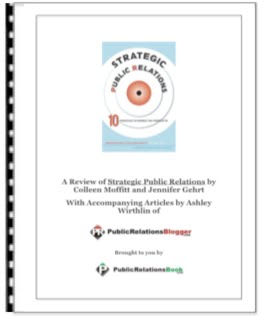________________________________________________________________________
Word of mouth (WOM), as described in the Public Relations Blogger Glossary, is "the advertising of a product or brand that takes place between customers. This is promoted through 'people networks', referring to WOM as word of mouse as well. There is no outside influence or management from the company or brand."
What is Word of Mouth (WOM), and Why is it Important?
________________________________________
Word of mouth (WOM), as described in the Public Relations Blogger Glossary, is "the advertising of a product or brand that takes place between customers. This is promoted through 'people networks', referring to WOM as word of mouse as well. There is no outside influence or management from the company or brand."Though WOM is a little different than what one might define as advertising, it is a way that consumers and potential buyers become aware of your product or services. WOM is often referred to as gossip; like gossip was in high school, it can have a dramatic effect on your company, and is usually out of your control. As with viral content, companies are rarely the source of the content but can benefit from it. (For example, Mentos benefited greatly from the YouTube videos showcasing their mints at work with Coca Cola that were created by consumers outside of the company.)
As consumers, we constantly create WOM for companies we enjoy, and more often ones that we do not enjoy. Consumers are more likely to talk about a bad experience or a bad product than one that served its purpose as advertised and one they were content with. Conversely, when a consumer becomes loyal to a brand, they are prone to talk about, advertise for, and advocate for that brand. Negative WOM can do some serious damage; consumers listen to the "reviews" of other customers more than what a company will say about their product or services and will base their decisions on what they are told by friends or people in their social network online; it can be hard to monitor and even harder to control. You may not be able to control or monitor what is said in coffee shops or over the phone, but you can monitor what is said about you online.
Though it is hard to control, there are ways that you can influence WOM:
- Be a responsible company, which means taking responsibility. This can be socially, environmentally, and in relation to consumer complaints and potential crises. Avoid putting the blame on another company; your consumers will not appreciate that.
- Be a responsive company. This means taking action and being involved. For example, product recalls, misinformation, or a company scandal are things that should be addressed and dealt with. Response can happen online, in a press conference, or an interview with the media. Try to avoid disappearing and being unavailable to give answers.
- Respond in a timely manner. This is a crucial part of avoiding a crisis and hindering the results that WOM can cause. WOM can spread like a wild fire, especially with the number of users online and talking.
- Do your research, before you respond. If WOM is doing damage to your company, but is definitely false, you may not need to respond at all. For example, when Pepsi was accused to allowing syringes to be canned in some of their soda, they waited to respond until they were sure of the accusations' falsity. Though taking responsibility is important, knowing that the rumor was not possible, they save millions of dollars that would have been spent in a recall. Had the rumor been true, it would have been crucial that they had responded differently. The rumor was eventually found to be just that, a rumor.
Additionally, WOMMA defines Word of Mouth Marketing as: Giving people a reason to talk about your products and services, and making it easier for that conversation to take place. It is the art and science of building active, mutually beneficial consumer-to-consumer and consumer-to-marketer communications.
Create places where customers can talk with each other, where you can talk to your customers, and where answers can be found. Furthermore, it is a vital part of your public relations planning that you track WOM about your company and take it somewhat seriously. To reiterate, consumers base their purchasing decisions on what their friends and peers say. If there is a complaint somewhere online that you have access to, try responding. (Note that this takes some common sense, and responding must be done only in the right situations.) If consumers begin talking poorly about your company, but are somewhat misinformed or are looking for answers, take the initiative to reply to their concerns.
Don't advertise yourself in these spaces, but come as a source for answers. They will usually appreciate what you have to say and that you took the time to listen to them. This simple step of monitoring your online presence can help your company greatly by avoiding negative news, alleviating a potential crisis, and can help to improve your overall company image by being responsible for your actions, products, and potential shortfalls.
WOM is a powerful aspect of public relations and marketing; do not underestimate its effects on your company and products. Encourage positive WOM while responding to negative WOM.
Subscribe to:
Post Comments (Atom)






Comments (0)
Post a Comment